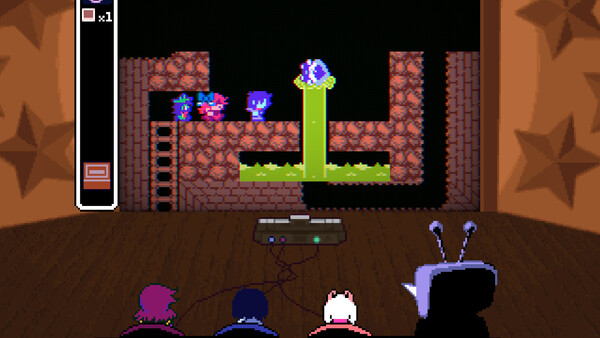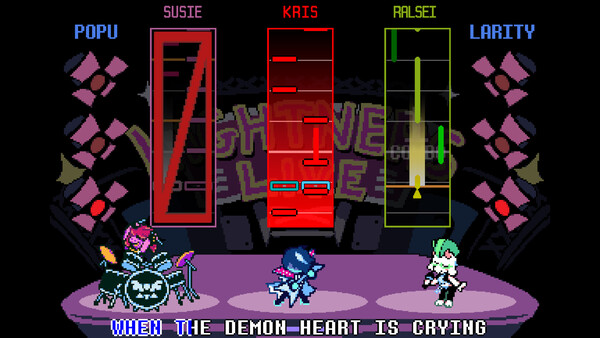Popular Now
DELTARUNE, Toby Fox’s spiritual follow-up to Undertale, offers players the choice to resolve battles without violence through its unique ACT and SPARE mechanics. While traditional RPGs emphasize fighting and leveling up, DELTARUNE introduces a compelling system where non-violent conflict resolution is not only possible but often rewarding.
This guide will walk you through how to spare enemies in DELTARUNE, from learning the ACT system to building TP, calming enemies, and unlocking peaceful endings — one monster at a time.
What Does “Sparing” Mean in DELTARUNE?
Sparing is an alternative to fighting, allowing you to end battles without defeating or killing enemies. Instead of lowering an enemy’s HP to zero, you fulfill certain conditions that make them “ready to be spared.”

Why Spare Instead of Fight?
-
Maintain a Pacifist route
-
Unlock unique dialogue and story paths
-
Avoid EXP gain and stay at lower LV (Level of Violence)
-
Strengthen party dynamics and worldbuilding
Sparing can lead to alternate character developments and is often favored by players who enjoy a peaceful, story-driven experience.
Understanding the ACT Command
The ACT command is the heart of the sparing system. Each enemy has a unique set of ACT options depending on its type and mood.
How ACT Works
-
Choose a character (usually Kris) to ACT on an enemy
-
Select a specific action (e.g., Compliment, Warn, Flatter, Sing)
-
These actions influence the enemy's behavior or mood
After completing the right combination of actions, the enemy’s name will turn yellow, signaling they can be spared.
Example ACT Sequences
-
Rudin: Convince
-
Hathy: Flatter
-
Lancer: Warning + Compliment
-
Jevil: Tire + Pacify (or defeat)
Each enemy has a puzzle-like interaction, so experimenting with ACT options is key to success.
Recognizing When You Can Spare
You’ll know you can spare an enemy when their name turns yellow in the enemy list. At this point, selecting SPARE from the menu will peacefully end the fight with that enemy.
Multi-Enemy Fights
Sometimes, only one enemy becomes ready to spare at a time. Be strategic:
-
Act on one enemy while defending with others
-
Spare enemies as they become eligible
-
Use Magic (like Ralsei’s Pacify) to remove tired enemies instantly
Managing turn order and party actions is critical in these moments.
Using Ralsei’s Pacify Spell
Ralsei’s Pacify spell is another powerful sparing tool. It allows you to spare tired enemies without using ACT options — provided the enemy is in a tired state.

How to Use Pacify
-
Tire the enemy using actions (like Susie’s Sleepy Charge or Kris’ ACT options)
-
Once tired, Ralsei’s Pacify becomes effective
-
Requires sufficient TP to cast
Pacify is especially useful in boss fights or when you need to remove one enemy to simplify a crowded field.
Managing TP to Enable Pacify and Other Spells
To use magic like Pacify, you must build TP (Tension Points) by:
-
Defending
-
Grazing enemy bullets (coming close without being hit)
-
Performing specific actions that trigger bonus TP
TP Management Tips
-
Defend with characters not using ACT or Fight
-
Position the soul close to attacks to build TP faster
-
Use TP efficiently—don’t hoard it unless planning a major spell
Good TP control keeps your magic options flexible, which is essential for advanced sparing strategies.
Susie and the Challenge of Early Sparing
In early chapters of DELTARUNE, Susie does not cooperate with sparing and will attack enemies without warning. This can complicate non-violent efforts.
How to Handle Susie e
e
-
Later in the story, Susie begins to follow your choices more willingly
Until then, sparing requires managing Susie carefully, making her a wild card in early encounters.
Learning Enemy Patterns and Behaviors
To spare enemies efficiently, it helps to understand their personalities and behavior types. Each enemy has dialogue, animations, and tells that hint at their sparing conditions.
Common Enemy Types
-
Shy enemies respond to flattery or kindness
-
Aggressive enemies calm down after warnings or distractions
-
Quirky enemies might require specific, humorous actions
Take the time to read enemy responses. The more you know, the fewer turns you’ll waste trying the wrong ACT options.
Benefits of Sparing in the Long Run
Aside from the satisfaction of completing battles non-violently, sparing:
-
Unlocks alternate cutscenes and conversations
-
Keeps your team’s Level low, resulting in different story paths
-
Reinforces themes of empathy, patience, and understanding
DELTARUNE rewards sparing through story beats, character development, and unique endings.
Special Cases and Boss Battles
Some boss characters can be spared, but it often requires more effort.
Examples
-
Jevil: Can be defeated or spared by tiring him and using Pacify
-
Spamton: Has multiple routes based on your choices
-
King: Not spared traditionally, but affected by story decisions
Sparing bosses often unlocks bonus scenes, optional items, or alternate story developments.
Practicing Sparing and Perfecting Your Strategy
The best way to improve your sparing skills is through practice and observation.

Pro Tips
-
Revisit previous areas to test sparing techniques
-
Memorize common enemy reactions
-
Don’t be afraid to reset a battle to try a different strategy
-
Use the Save Points to plan ahead before big encounters
Over time, you’ll be able to breeze through most fights with minimal damage and maximum impact.
Conclusion: The Power of Choice
Sparing enemies in DELTARUNE isn’t just a mechanic — it’s a statement. The game invites players to think beyond violence, rewarding those who take the time to understand and empathize with their foes.
By mastering the ACT system, managing TP, and learning enemy behaviors, you’ll open up a world of story depth and strategic possibilities. Whether you’re chasing the pacifist route or just looking for a fresh challenge, sparing is the heart of DELTARUNE’s combat philosophy.
















